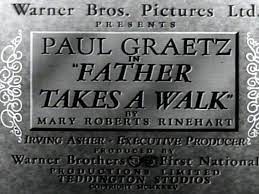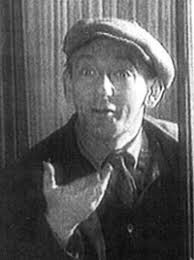|
There are certain national chain stores, one in particular that, for me, always results in an exasperating experience. I am expected to use the ‘self-check-out’ which I’m not particularly adept at and the whole experience makes me feel unwanted. A robot tells me ‘thank you for shopping here’ and not the human being who is standing two feet from me and it is then that I feel I have entered the Twilight Zone. It’s dispiriting that a store believes ‘automation’ adds dollars to their bottom line. They forget that our continued patronage depends upon experiencing a pleasant human interaction while shopping and that is what will truly make or break their bottom line. After all, we consumers are their lifeblood.
This reminds me of a British movie I saw not too long ago. It is all about Jake Cohen, a fictional character who appears to be in his late 60’s. The name of the movie is “Mr. Cohen takes a walk.” This 1935 Warner Brothers movie was originally regarded as a low budget film produced quickly and cheaply in order to satisfy the requirements of the Cinematograph Film Act of 1927, an act of the U.K. Parliament designed to stimulate the declining British film industry by obligating film distributors to use a minimum quota of British films. In spite of this, I deem this film a rare movie that should be given serious consideration because of its content, execution and overall message. I regard this ‘gem’ not only as a charming little masterpiece but also a fable with a lot of food for thought.
This movie was also given an alternate title; “Father Takes a Walk,” the name change due to the anti-Semitic sentiments that were sweeping Europe at the time of its production and release. The film is scored throughout with traditional and spiritual Jewish melodies which provide additional substance and emphasis to the narrative. Here is Mr. Cohen’s story:
The film portrays Jake Cohen as a good man. He was once a peddler with a pushcart in the poor neighborhoods of England and now he is a legendary merchant who owns the biggest and finest department store chains in all of England fittingly called “The Empire.” Yet his sons don’t seem to need him around anymore. They have big fancy ideas and are moving into a more automated and less personal model for the store; how it is advertised and how it is run inside and out. They are embarrassed by their father’s old ways, for instance, he stands in front of the store and ‘hawks’ for customers to come in and shop. He is always showing his big personality and love of people. His sons are going faster than he can keep up. They are entering the world of technology. His sons are literally and figuratively putting him out to pasture. He needs to be needed, as all people do He laments to his wife that “I’m not a machine……I wish we were peddling again, you and me together just like when we were young and poor.” With deep sorrow he adds “I don’t have anything to worry about anymore.” His wonderful wife of many years understands and agrees. They live in a big mansion with servants, a chauffeur and everything and everybody is at his beck-and-call…except his sons who BELIEVE they know better than him because they consider themselves forward thinking.
One day while giving a party his wife is stricken and dies later that night and on her deathbed she tells Jake that she has no regrets and thanks him for the wonderful life she has lived. She dies while they clutch each other. Now, without her, he is totally adrift in a no-man’s land. To make things worse, his youngest son doesn’t want to marry his childhood girlfriend, Julia, but instead lusts after a shiksa he met on the ship from NY to London.
So, as it goes, Mr. Cohen wants to build a new store from the ground up. A regular old-fashioned store where he can advertise the way he wants and stand in front and coax potential customers to come in and shop. He yearns for the good old days where things were simple and everything had a personal touch. So he puts on his comfortable shoes, and with his walking stick he sets out upon a new adventure. A dog befriends him along the way and the two ‘strays’ travel together along dusty roads and over hill and dale. The ‘perfect pals’ appreciate the sights and sounds of the countryside, inhaling the fresh air, appreciating the trees and without the benefit of efficiency experts to tell them how to do it. Also, along the way he meets many people of all types and stripes. One kind elderly woman he meets on the trail tells him that “No person is old while they could do things for others.” She also tells him that “the road ahead looks narrow as though it will end but you’ll see when you get there that it is as wide as ever.” He conceals a few quid in her horse’s bridle.
The elderly Mr. Cohen also helps a young man who was caught stealing a roasted chicken. He helps him by sharing ‘the rap’ and together they work off their debt by doing a lot of hard work - just what he yearns for. When they part ways, he gives him a note to take to his son in the department store because by now they are worried about him. The note also instructs his son to give the starving, but earnest, young man a job at the store. It is there where Julia, the jilted girlfriend, and the young man lock eyes in love and in this story, their first “five minutes” winds them up together forever.
Mr. Cohen meets and helps others along the way and as in a self-fulfilling prophecy; he needs and becomes needed again. Those he helps have no clue how rich and successful he is. He travels around posing as an “everyman” which is who he really is deep down. One day he reads big headlines in the newspaper that his store, “The Empire,” is in the midst of a big labor strike involving all 3,000 workers and the negotiations are deadlocked. He hitches a ride on a lorry and races back to the store because his ‘know-it-all’ sons don’t know how to deal with human nature whereas he has been gently and cleverly doing so all his life. The strike is ended amicably in a way that only Mr. Cohen Sr. can resolve. He says “You have to use your heart as well as your head in business.”
Then, after first recovering from some ill-advised meddling by Mr. Cohen, his youngest son gets married to the shiksa he ‘fell in love with in 5 minutes.’ They begin with a glorious wedding in a church and then with equal glory, another one in a temple. Jake Cohen sits at both proudly with his new gentile mochatunum by his side and says: “It is best that all religions get together for the sake of peace because of all the trouble in the world.”
The morals of this fable are too many to list. Always remember that your parents gave you the gift of life and no matter how you slice and dice it, they built you an “empire.”
They are your lifeblood and never obsolete.
Below is an image of the opening title of the movie, “Mr. Cohen Takes a Walk,“ and an image of Mr. Cohen as played by the actor Paul Graetz along with a short bio about him.
Happy Holidays,
Dorothy Douma Greene
|



